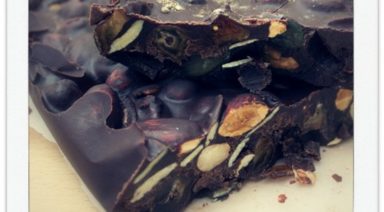What Your Food Cravings Really Mean

Ever had a craving you just can’t shake? Is there only one particular food that can always pull you out of an emotional rut? Have you ever wondered where the phrase“Eat your feelings” even comes from or what causes food cravings in the first place?
Of course, you have! You’re only human! Most people accept food cravings as a normal part of everyday life without really ever asking what these food cravings mean.” No two bodies are the same, and therefore no two reasons behind a specific food craving are the same. While some may be rooted in nutritional deficits – others may be a deeper signal from our Spirit echoing throughout our bodies.
Your mind, body, and Spirit communicate through an intricate language, which isn’t always easy to decipher. However, with a little effort, you can translate these signals and create the harmony needed for improved health.
For most, we’ve been taught to “overcome” our bodily cues with medicine or supplements. For example, when a person has a headache, they’re taught to reach for the Advil bottle rather than lying down and drinking lots of water. However, no matter how much you resent, ignore, or overlook your bodily cues – they’re not going to go away.
When looking at a type of food craving specifically, emotions are one of the most common causes of binge eating. Cravings that cause emotional eating tend to manifest themselves when we feel vulnerable. Rather than expressing fluctuations in our emotions, we tend to stuff them down with “comfort foods” that give our bodies a false sense of fulfillment. After a while, your body learns this routine, creating cravings that, when satiated, provide a short-term boost of chemical components. By deciphering the real meaning of your cravings, you can get insight as to what’s truly gnawing at you from within.
Gaining knowledge about what our cravings can mean, whether through personal research or consulting with a dietitian, may help us to reduce unhealthy habits and poor food choices that may lead to undesirable outcomes like weight gain and obesity. The following are the three most common food cravings and a starting point for you to decrypt what your mind, body, and Spirit are trying to tell you.
Craving Sweets
Physical
- Lack of sleep and energy
- Dehydration
- Blood Sugar imbalances
- Chromium or Magnesium deficiencies
- Fatty Acid deficiency
- Elevated cortisol and ghrelin (hunger hormone) levels
Emotional
- Sadness
- Stress
There have been several studies that show how sugar can affect the same brain regions as drugs and alcohol. This is because simple carbohydrates, such as sugar, are digested faster than complex carbs and give an immediate energy and dopamine boost. Chocolate specifically is also metabolized to serotonin, a mood-boosting hormone, so cravings can also be related to an emotional need. However, this momentary mood improvement is generally followed by a serious drop, which spurs people to reach for another sugary snack like ice cream, and forms an addictive cycle.
Balancers
- Fresh Fruit
- Healthy Cocoa or Dark Chocolate
- Water
- Getting a massage
- Talking with loved ones
- Long walks
- Getting enough sleep
- Any activity that makes you feel good
Instead of indulging in a chocolate craving and grabbing the closest chocolate bar, choose a piece of fruit when you’re craving sweet foods. Giving into unhealthy foods like cookies, cakes, soft drinks or other refined sweets will only make the problem worse, and cause a blood sugar roller coaster that leads to more cravings.
When you’re seeking to balance this, think about whether or not any other experiences could satiate your sugar craving, such as getting a massage or a bath, or sitting in the beauty of nature. Besides healthy cocoa or dark chocolate, reach for a loved one, friend, pet, or any activity that makes you feel good and ensure you’re getting enough sleep each night. The important thing is to remember that there is a difference between sweetness that heals and sweetness that temporarily bandages.
Craving Salts
Physical
- Low electrolyte levels
- Dehydration
- Chloride Deficiency
- Iodine deficiency
Emotional
- Stress
- Fatigue
When adding salty foods like fries to your meal seems too good to pass up – it may be time to re-evaluate your daily life. Excess and chronic stress can lead to adrenal exhaustion, and you might be pushing yourself further than your body can handle. Your body craves salt when your stress levels are intensely raised for a prolonged period and deplete your adrenal gland’s ability to create aldosterone, a hormone that helps to retain sodium.
With reduced levels of sodium, your body is unable to maintain proper hydration levels and can become dehydrated. A hankering for salt may be related to iodine nutrient deficiency as well, as it is the body’s way of calling out for natural sea-based minerals.
Salt cravings can indicate that you are trying to “solidify” yourself in your overwhelmed state. Subconsciously, you may be trying to fortify yourself with the hardness and strength of salt’s solid construct, to deal with your situation.
Balancers
- Vitamin B-rich foods (Nuts, seeds, legumes, whole grains, fruits, and vegetables)
- Water
- Exercise
- Meditation
- Yoga
Find strength in trust and flexibility rather than fortifying and enforcing the walls around you. The hardness you wish to develop through salts only creates resistance, not healing. Instead of reaching for a salty snack like potato chips – try distressing in more healthy and productive ways. Eat foods rich in vitamin B such as oats or wild salmon to increase adrenal support. While exercise is a sure-fire way to balance your body and expel negative stress from the body, meditation, and mindful relaxation are also great mood balancers, as well.
Craving Fats
Physical
- Calcium Deficiency
- Fatty Acid Deficiency
- Elevated ghrelin levels
Emotional
- Hurt
- Loss
- Depleted Self-Worth
While all foods in moderation are quite normal – if you constantly over-indulge in calorie-dense fatty foods, you know your body is out of balance. Cravings for peanut butter, oils, or fried foods often relate to a calcium deficiency, as saturated fats are necessary to help maintain calcium in the body and build bone density. However, the wrong fatty foods often have enough calories to leave you bloated, perpetuating your body’s intense desire to sink into lethargy and despair.
On a spiritual level, you may be craving foods that are high-fat because you have yet to accept your own importance and feel the need to keep the full reality of your power squashed down by physical discomfort. In this instance, your cravings are probably coming from a wounded ego, looking to perpetuate old hurts and a reduced sense of self-worth.
Balancers
- Omega 3’s (EPA and DHA) – Flax oil, ground flaxseeds, chia seeds, walnuts
- Sesame seeds
- Broccoli
- Kale
- Legumes
- Mustard
What Food Cravings Mean in the Journey Towards Self-Understanding
Taking the time to explore the meaning behind food cravings can offer significantly valuable insights into not only the physical aspects of our lives but also our emotional landscape. Understanding why we crave certain foods can reveal underlying emotions or unmet needs, guiding us toward healthier coping mechanisms and ultimately fostering a greater sense of self-awareness and empowerment.
Accepting our own authenticity and importance frees our power and allows us to go against social norms that cultivate insecurity. Through articulating our experience and understanding ourselves better, it’s possible to see how beautiful we truly are, and how much we have to give the world. This releases restrictions on our sense of personal power and allows a stronger mind to take back control. Consider practicing core exercises to cultivate your third chakra, which is the center of your self-esteem and willpower.
Health Benefits of Castor Oil Packs: What You Need to Know

Castor oil packs have been used for centuries as a natural remedy to support overall wellness. Countless people use them for pain relief, skin health, and even to support liver function. Simply soaking a cloth in castor oil and applying it to the skin, these packs are believed to help with detoxification, reduce inflammation, and promote better digestion. While castor oil packs are a relatively simple and gentle healing tool, understanding their proper use is essential to maximizing benefits and minimizing potential side effects.
What is Castor Oil?
Extracted from the seeds of the Ricinus communis plant, castor oil has been valued for centuries across various cultures for its medicinal and industrial applications. This castor plant, native to Africa, India, and the Mediterranean region, has become one of the world’s oldest cultivated crops. The oil pulled from these seeds is rich in ricinoleic acid, a monounsaturated fatty acid believed to be responsible for many of its therapeutic properties.
Historically, castor oil’s use dates back to ancient Egypt, where it was documented in medical papyri around 1550 BCE, primarily as a laxative to relieve constipation. Over time, its applications have diversified:
- Laxative Properties: Castor oil is approved by the Food and Drug Administration (FDA) as a stimulant laxative. It works by stimulating nerves in the gastrointestinal tract and increasing bowel movements, which helps relieve occasional constipation.
- Skin Care: It serves as a moisturizer to treat or prevent dry, rough, scaly, or itchy skin and minor skin irritations.
- Wound Healing: The oil contains antibacterial and antimicrobial properties that may aid in speeding up wound healing, especially when combined with other substances.
- Anti-Inflammatory Properties: Castor oil may help reduce inflammation and possibly improve blood flow of the lymphatic system.
- Hair Care: It’s commonly used in hair products to condition and moisturize hair, promoting hair growth and overall hair health.





































